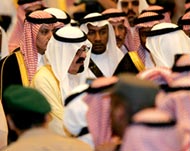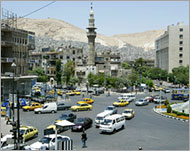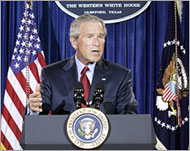PR firms burnish Arab image in US
In May this year reports surfaced that the Syrian government had hired an American firm with close ties to the Bush administration to help launch a public relations campaign designed to rehabilitate Syria’s image in the US.

Although the report turned out to be false, the strategy is not without precedent.
For years Arab countries have employed US PR firms in an effort to lobby members of Congress, cultivate business relationships with American companies, and burnish their public image.
“It’s not all that unusual for Arab countries to enlist US PR firms to help with any image problems that they might be experiencing in the United States,” says Mark Hand, Washington, DC bureau chief for PR Week, an international newsletter about the public relations industry.
While economic incentives have often been the primary impetus in the past, Arab states such as Saudi Arabia and Kuwait felt the need to expand their PR efforts following the 11 September 2001 attacks.
“These countries need the assistance of people on the ground here in the United States who are familiar with the best tactics for earning beneficial media coverage for controversial clients,” Hand said.
Sponsored screenings
Kuwait, which enjoyed good diplomatic relations with the US during the nearly 15 years since the first Gulf War, hired the New York PR firm Peppercom to market a Kuwaiti-directed documentary about the 11 September attacks.
The Kuwaiti government even sponsored screenings of the film, designed to underscore Kuwait’s positive relationship with the US.
Saudi Arabia, which has a longstanding political and economic partnership with the US, spent more than $15 million in 2002 on public-relations campaigns in the US, according to records kept by the Department of Justice (DoJ) under the Foreign Agents Registration Act (FARA).
 |
|
Saudi Arabia has a longstanding |
Most of those funds went to Qorvis Communications, LLC, a Virginia company hired to promote Saudi Arabia’s “commitment in the war against terrorism and to peace in the Middle East“, according to a DoJ summary of the contract.
The promotion included a series of newspaper and radio advertisements publicising the Saudi government’s stance against terrorism.
Whether such efforts have been successful is unclear, said Diane Farsetta, a senior researcher at PR Watch, a watchdog journal published by the Center for Media and Democracy.
“[The Saudi PR campaign by Qorvis] was very overt,” she added. “It was very over the top … and I would say it doesn’t seem like it’s been very effective.”
Public opinion
Whatever American public opinion of Saudi Arabia, the US-Saudi relationship remains strong for the time being, though Hand couldn’t say how much of that was attributable to the Saudi PR strategy.
“While Saudi Arabia certainly has a negative image in the US, the regime still enjoys a certain level of Teflon status here,” he said.
“Whether this protected status in the US is the result of hard work by its PR representatives and lobbyists in Washington, is hard to gauge. The fact that the US government keeps close ties with the regime is probably more related to the US economy’s reliance on Saudi oil.”
Unlike oil-rich Saudi Arabia, not every country in the Arab world can afford to spend millions of dollars to hire PR strategists.
Syria is one nation that would like to rebuild its image in the US, but lacks the financial resources to do so, according to Ammar Alarsan, a spokesman for the Syrian embassy in Washington.
 |
|
Syria is trying to rehabilitate its |
“The Syrian image in the American public is not that good,” Alarsan said. “Our efforts in that area are not that good because of our budget.”
Although diplomatic relations between the US and Syria appeared to take a reconciliatory turn following Syria’s post-9/11 cooperation in the US fight against al-Qaida, whatever diplomatic progress was made has vanished in a crossfire of criticism over Iraq, the “war on terrorism” and Syrian influence in Lebanon.
The Bush administration has repeatedly accused Syria of not doing enough to secure the border with Iraq, as well as providing support to terrorist organisations and meddling in Lebanese politics.
Fractured relationship
Syria, in turn, opposed the US invasion of Iraq and has been critical of the administration’s handling of the Israeli-Palestinian conflict.
The relationship became so fractured that in late 2003, President Bush signed the Syria Accountability and Lebanese Sovereignty Restoration Act, a congressional bill authorising a list of sanctions against Syria.
“US-Syrian relations are extremely strained,” Judith Kipper, director of the Middle East Forum at the Council on Foreign Relations, says. “There is virtually no diplomatic discussion between the two.”
Consequently, Syria is attempting to rehabilitate its image in the eyes of the American public and the Bush administration.
“What we want from the American public and the Bush administration is to understand that Syria has good intentions for the Middle East as a region,” Alarsan said.
Any effort, however, to boost its standing in the US could present significant challenges for Syria, according to Murhaf Jouejati, an foreign policy expert at the Middle East Institute.
“I think it is a good thing in the long run to work with American companies to improve Syria’s image, but in the short term I think it’s too little too late as far as its relationship with the Bush administration,” Jouejati said.
 |
|
Bush signed bill authorising |
Recent media reports indicated that Syria had already hired an American firm, New Bridge Strategies, to help launch a pubic relations campaign in the US.
Syrian embassy spokesman Alarsan, though, denied those reports, saying no formal business arrangement ever materialised.
He said the Syrian ambassador to the US, Imad Moustapha, had several informal conversations with New Bridge President Joe Allbaugh, a long-time political ally of President Bush.
“[Allbaugh] offered to use his good relations with the US administration to facilitate a dialogue between the US and Syria,” he said.
Distortion
While many US officials believe American foreign policy is often distorted by the Arab media, Alarsan expressed similar denunciations of US media coverage of Syria, a sentiment echoed by Jouejati.
“Whenever the Bush administration says ‘jump’, the American media says ‘how high?'” he said. “The Syrian issue has not been treated fairly by the American media.”
Kipper dismissed such attitudes and said Syria must rethink its global vision if it expects to shed its negative image in the US.
“Syria does not have a public-relations problem,” she said.
“Syria has a very serious strategic problem that can only be resolved by a realistic assessment of Syria‘s interests and a change in direction and policy … . Harbouring and sponsoring groups that do political violence is not in Syria‘s national interest, nor is meddling in the internal affairs of Lebanon or interfering in Iraq.”
Arab states looking to American PR firms for an image makeover are partly following in the footsteps of the US government itself, which, according to Hand and others, has often turned to private-sector groups for assistance in promoting certain policies.
|
“Whenever the Bush administration says ‘jump’, the American media says ‘how high?” Ammar Alarsan, |
“The US government, particularly the Pentagon, has been increasingly seeking outside PR help in its war in Iraq,” Hand said.
“The Pentagon hopes that this outside counsel will inject some creativity into its campaign to turn the tide of public opinion in the Middle East in its favour. But most of the efforts have failed.”
Laura Miller, the editor of PR Watch, pointed to the Rendon Group, an international communications strategy firm which has received $40 million from the Department of Defence since 11 September 2001, according to a report by the Contra Costa Times.
The Rendon Group, which PR Watch refers to as the Pentagon’s “information warrior”, was reportedly hired by the CIA to help organise and promote the activities of the Iraqi National Congress following the end of the first Gulf War in 1991.
Seymour Hersh, an investigative reporter for the New Yorker magazine, reported that the Rendon Group received nearly $100 million from the CIA during a five-year period in the 1990s for these and other PR services.